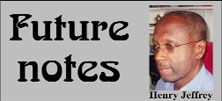No one vaguely familiar with liberal foreign policy analysis could fail to ponder the possibility of an expanding liberal zone of peace. Since Minister Priya Manickchand’s, unfortunate, 4th of July statement there has been much theorizing about the zeal for the spread of democracy among Western diplomats. I have argued before that in the case of the United States of America, this is rooted in a long tradition (“Lead without leadership,” SN: 14/05/2014). But it also appears to me that much of the democratic evangelizing that today exists in some Western foreign policy circles has to do essentially with their own national security concerns.

In a 2005 book entitled “Breaking the Real Axis of Evil: How to Oust the World’s Last Dictators by 2025,” Mark Palmer, a democracy activist and former US ambassador to Hungary and speech-writer to President Ronald Reagan, called for a global strategy to rid the world of the remaining forty-five autocratic regimes. He would give Obama’s fourth

